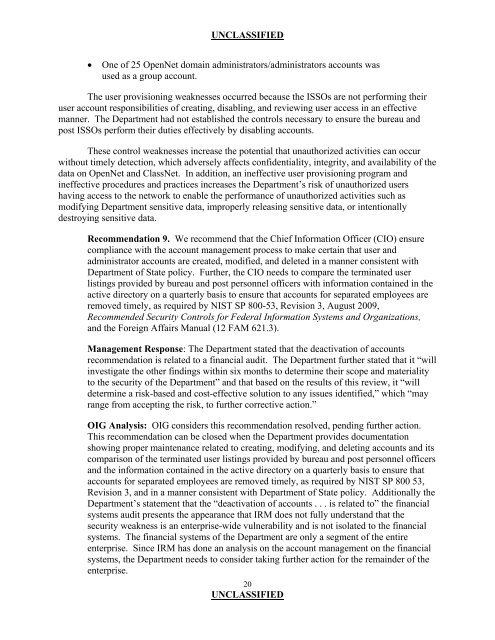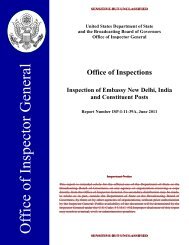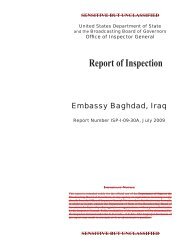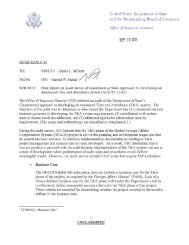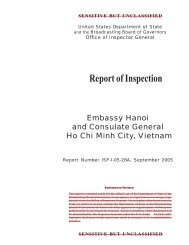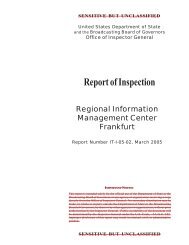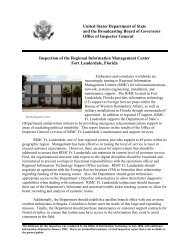Evaluation of Department of State Information Security Program ...
Evaluation of Department of State Information Security Program ...
Evaluation of Department of State Information Security Program ...
You also want an ePaper? Increase the reach of your titles
YUMPU automatically turns print PDFs into web optimized ePapers that Google loves.
UNCLASSIFIED<br />
� One <strong>of</strong> 25 OpenNet domain administrators/administrators accounts was<br />
used as a group account.<br />
The user provisioning weaknesses occurred because the ISSOs are not performing their<br />
user account responsibilities <strong>of</strong> creating, disabling, and reviewing user access in an effective<br />
manner. The <strong>Department</strong> had not established the controls necessary to ensure the bureau and<br />
post ISSOs perform their duties effectively by disabling accounts.<br />
These control weaknesses increase the potential that unauthorized activities can occur<br />
without timely detection, which adversely affects confidentiality, integrity, and availability <strong>of</strong> the<br />
data on OpenNet and ClassNet. In addition, an ineffective user provisioning program and<br />
ineffective procedures and practices increases the <strong>Department</strong>’s risk <strong>of</strong> unauthorized users<br />
having access to the network to enable the performance <strong>of</strong> unauthorized activities such as<br />
modifying <strong>Department</strong> sensitive data, improperly releasing sensitive data, or intentionally<br />
destroying sensitive data.<br />
Recommendation 9. We recommend that the Chief <strong>Information</strong> Officer (CIO) ensure<br />
compliance with the account management process to make certain that user and<br />
administrator accounts are created, modified, and deleted in a manner consistent with<br />
<strong>Department</strong> <strong>of</strong> <strong>State</strong> policy. Further, the CIO needs to compare the terminated user<br />
listings provided by bureau and post personnel <strong>of</strong>ficers with information contained in the<br />
active directory on a quarterly basis to ensure that accounts for separated employees are<br />
removed timely, as required by NIST SP 800-53, Revision 3, August 2009,<br />
Recommended <strong>Security</strong> Controls for Federal <strong>Information</strong> Systems and Organizations,<br />
and the Foreign Affairs Manual (12 FAM 621.3).<br />
Management Response: The <strong>Department</strong> stated that the deactivation <strong>of</strong> accounts<br />
recommendation is related to a financial audit. The <strong>Department</strong> further stated that it “will<br />
investigate the other findings within six months to determine their scope and materiality<br />
to the security <strong>of</strong> the <strong>Department</strong>” and that based on the results <strong>of</strong> this review, it “will<br />
determine a risk-based and cost-effective solution to any issues identified,” which “may<br />
range from accepting the risk, to further corrective action.”<br />
OIG Analysis: OIG considers this recommendation resolved, pending further action.<br />
This recommendation can be closed when the <strong>Department</strong> provides documentation<br />
showing proper maintenance related to creating, modifying, and deleting accounts and its<br />
comparison <strong>of</strong> the terminated user listings provided by bureau and post personnel <strong>of</strong>ficers<br />
and the information contained in the active directory on a quarterly basis to ensure that<br />
accounts for separated employees are removed timely, as required by NIST SP 800 53,<br />
Revision 3, and in a manner consistent with <strong>Department</strong> <strong>of</strong> <strong>State</strong> policy. Additionally the<br />
<strong>Department</strong>’s statement that the “deactivation <strong>of</strong> accounts . . . is related to” the financial<br />
systems audit presents the appearance that IRM does not fully understand that the<br />
security weakness is an enterprise-wide vulnerability and is not isolated to the financial<br />
systems. The financial systems <strong>of</strong> the <strong>Department</strong> are only a segment <strong>of</strong> the entire<br />
enterprise. Since IRM has done an analysis on the account management on the financial<br />
systems, the <strong>Department</strong> needs to consider taking further action for the remainder <strong>of</strong> the<br />
enterprise.<br />
20<br />
UNCLASSIFIED


